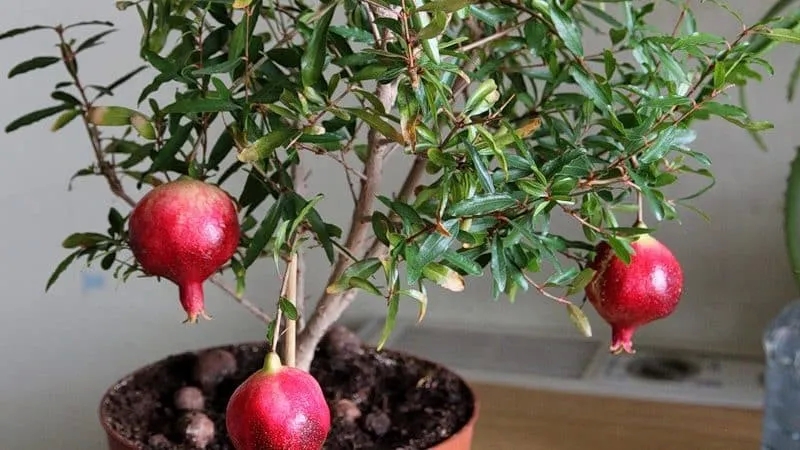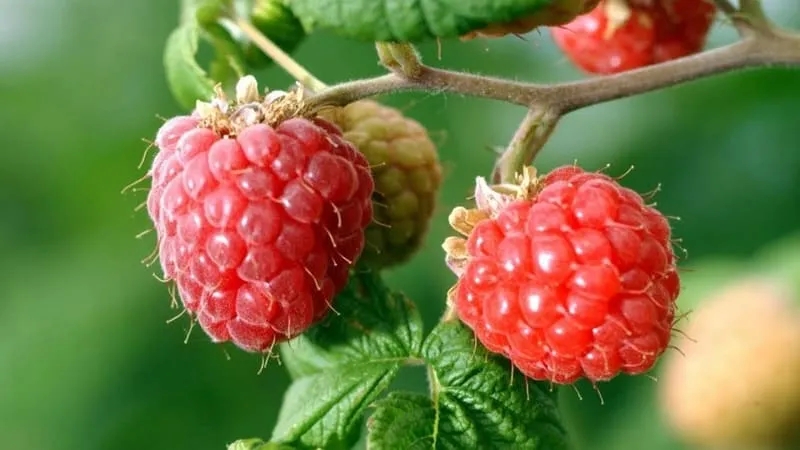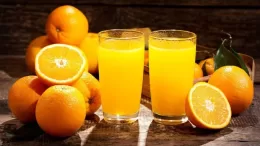Water is the foundation of our body. Structured water with an ordered intermolecular bond is especially beneficial: it is the primary component of plant-based foods. A delicious and healthy pumpkin drink contains essential vitamins, trace elements, and up to 90% structured water. The best pumpkin varieties for making this drink include Honey, Golden Parisian, Winter Sweet, and Butternut.
Table of contents
Composition and Properties of Pumpkin Juice
Let’s explore the benefits and potential drawbacks of pumpkin juice for the body.
This drink contains 30% beta-carotene, which synthesizes vitamin A (an antioxidant that slows aging), and 18% copper—a trace element crucial for proper immune and nervous system function. Copper stimulates the absorption of iron, proteins, and carbohydrates, helping oxygenate cells. Calcium, magnesium, iodine, and iron in pumpkin juice support normal bodily functions. Pectin and fiber improve intestinal health.
 Pumpkin is a source of the following vitamins:
Pumpkin is a source of the following vitamins:
- B — participates in metabolic processes;
- C — boosts immunity and protects against infections;
- E — positively affects cholesterol balance, skin health, and muscle development;
- K — improves blood clotting.
Per 100 g of juice, there are 38 kcal, 0.1 g of fat, 1 g of protein, 9 g of carbohydrates, 2 g of dietary fiber, and 91.8 g of water.
Health benefits of pumpkin juice:
- accelerates metabolism and aids weight loss due to its low calorie content;
- reduces excess cholesterol and detoxifies the body;
- enriches the body with essential trace elements and improves overall bodily functions.
Pumpkin juice may be harmful in cases of individual intolerance, low stomach acidity, or certain gastrointestinal disorders.
Health Benefits
This drink is recommended for preventing heart and digestive system diseases. It is also beneficial for managing the following conditions:
- gastritis and stomach ulcers — the juice has a gentle effect on the mucous layer and digestion;
- high cholesterol — the vitamins in pumpkin dissolve cholesterol plaques;
- low hemoglobin — like apples, pumpkin is rich in iron, making its juice or apple-pumpkin blend ideal for anemia;
- heart irregularities — potassium in the juice supports heart and vascular health;
- the natural compound cucurbitin in pumpkin safely eliminates parasitic worms;
- frequent colds — due to its high micronutrient and vitamin content (especially vitamin C), the juice strengthens immunity. A mix of pumpkin juice and honey can reduce fever;
- insomnia — the juice is rich in magnesium, which calms and relaxes the brain and muscles. Add honey to a glass of freshly squeezed juice for taste;
- excess weight — pumpkin is nutritious yet low in calories, aiding weight loss. On detox days, drink a glass of pumpkin juice three times a day alongside vegetable-based meals. For juice fasting, combine it with other vegetable and fruit juices like carrot, beetroot, spinach, cabbage, celery, or apple.
Important! Add no more than 2 tablespoons of freshly squeezed carrot or beetroot juice.
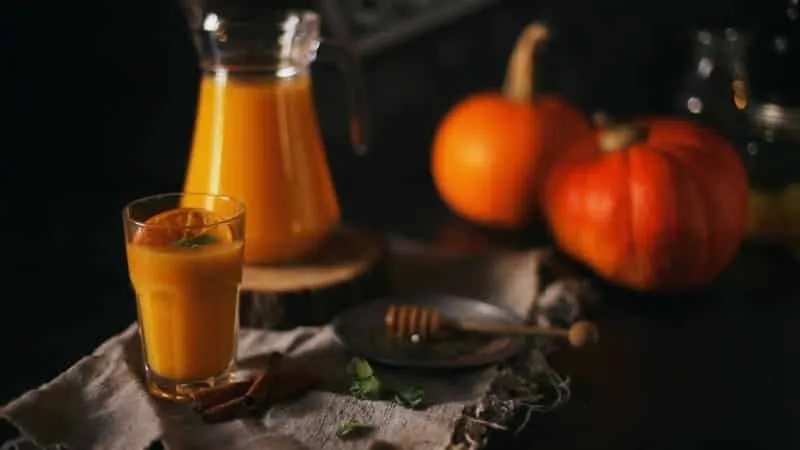
Value for Different Body Systems
Pumpkin juice is beneficial in the following cases:
- If kidney or gallbladder stones are diagnosed, drinking half a glass of juice three times a day is recommended.
- Beta-carotene restores vision and reduces the risk of cataracts, making pumpkin juice ideal for those with impaired eyesight.
- Pumpkin helps repair damaged liver cells. The juice is taken as a supplementary treatment—half a glass four times a day, 30 minutes before meals.
- For pancreatic inflammation, boiled pumpkin juice is introduced into the diet after therapeutic fasting.
Important! Raw juice is contraindicated in pancreatitis.
For Women, Men, and Children
Pumpkin aids in prostate health for men due to its anti-inflammatory and antibacterial properties. Zinc, found in pumpkin, is vital for male health. This trace element naturally boosts testosterone secretion, improves spermatogenesis, promotes hair growth, and protects blood vessels from atherosclerosis.
Regular consumption of pumpkin juice also benefits women’s health. The "beauty vitamin" E enhances skin smoothness and radiance. During pregnancy, the juice stabilizes mood swings, reduces nausea, and alleviates muscle cramps.
Pumpkin juice can be introduced to babies from seven months as complementary food.
Note: Consult a pediatrician before giving freshly prepared juice to a child.
Plant fiber gently improves intestinal motility, helping with constipation in children. If a child dislikes the taste of pumpkin, mix it with other vegetables or berries, such as apple, orange, grapefruit, blackcurrant, or gooseberry.
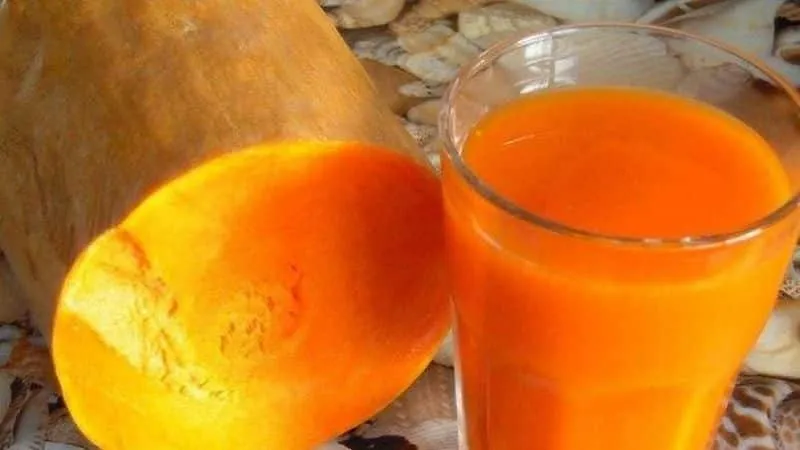
How to Prepare Properly
To make pumpkin juice, wash the pumpkin, peel it, remove the seeds, and cut it into small pieces. A juicer or grater will be needed. For a glass of clear juice, use 300-400 g of pumpkin and process it in a juicer. If unavailable, grate the pumpkin and strain through cheesecloth.
With Pulp
This version uses boiled pumpkin, extending its shelf life.
Ingredients:
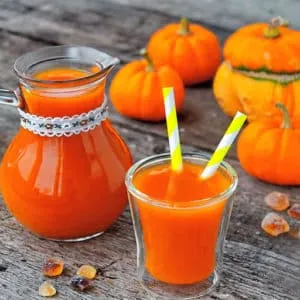 pumpkin — 1.5 kg;
pumpkin — 1.5 kg;- sugar — 250 g;
- citric acid — 1 tsp;
- water — 1 L.
Preparation:
- Boil peeled and chopped pumpkin in water for 10-15 minutes.
- Once soft, cool and blend or sieve.
- Add sugar and citric acid, then boil again, skimming foam.
- When foam stops forming, the juice is ready.
- Pour into clean, dry jars, seal, and cool at room temperature. Store in a cool place.
For enhanced flavor and benefits, add carrot, beetroot, apple, orange, pear, lemon, blackcurrant, or gooseberry juice. A tasty pulp-rich smoothie can be made by blending pumpkin juice with raspberries or bananas.
With Orange
Ingredients:
- pumpkin — 0.5 kg;
- sugar — 50 g;
- citric acid — ¼ tsp (or juice from 1 lemon);
- half an orange.
Preparation:
- Boil peeled and chopped pumpkin in water until tender.
- Blend with cooking water or sieve.
- Add orange and lemon juice, sugar, and simmer for 10 minutes.
- Cool and store in jars in the fridge.
With Lemon
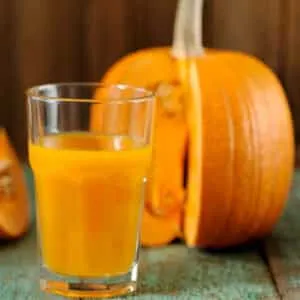 Ingredients:
Ingredients:
- peeled pumpkin — 1 kg;
- juice from 1 lemon;
- sugar — 1 cup (250 ml);
- water — 2.5 L.
Preparation:
- Boil peeled and chopped pumpkin in water until soft.
- Blend with water or sieve.
- Add lemon juice and sugar, then simmer for 10 minutes.
- Cool and store in the fridge.
With Apple
Ingredients:
- peeled pumpkin — 1 kg;
- apples — 1 kg;
- sugar — 200 g;
- citric acid — 10 g.
Preparation:
- Dice peeled pumpkin and apples, then boil with a little water to prevent burning.
- Cool and blend or sieve.
- Add sugar and citric acid, simmer for 10 minutes.
- Store in sealed jars in the fridge.
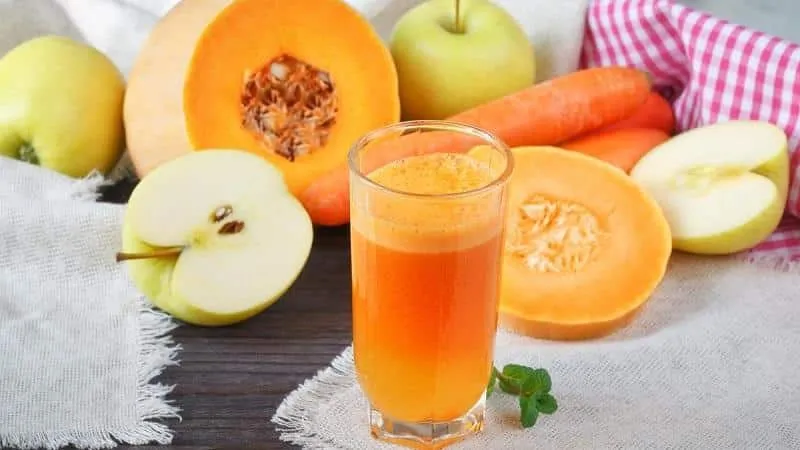
With Dried Apricots
Ingredients:
- peeled pumpkin — 1 kg;
- large carrot — 1 pc.;
- dried apricots — 200 g;
- sugar — 500 g;
- citric acid — 5 g;
- water — 3 L.
Preparation:
- Dice peeled vegetables.
- Soak dried apricots in hot water for an hour, then rinse and chop finely.
- Boil vegetables and apricots with 1 L water for 2 hours.
- Blend, add sugar, citric acid, and remaining water, then simmer for another hour.
- Pour into sterilized jars, seal, and cool upside down under a blanket. Store in a fridge or cellar.
How to Consume the Juice
Drink the juice 1-3 times daily, 20-30 minutes before meals. The recommended daily intake is 0.5-1 glass. Exceeding two glasses may hinder nutrient absorption. Consult a doctor for any gastrointestinal conditions.
Dosage varies by purpose:
- liver and gallbladder support — ¼ glass three times daily (up to 10 days) or a glass on an empty stomach;
- kidney stones — ½ glass three times daily (same duration);
- men’s health — ½ glass 2-3 times daily;
- pregnancy — ½ glass in the morning.
Note: Freshly squeezed juice should be consumed immediately.
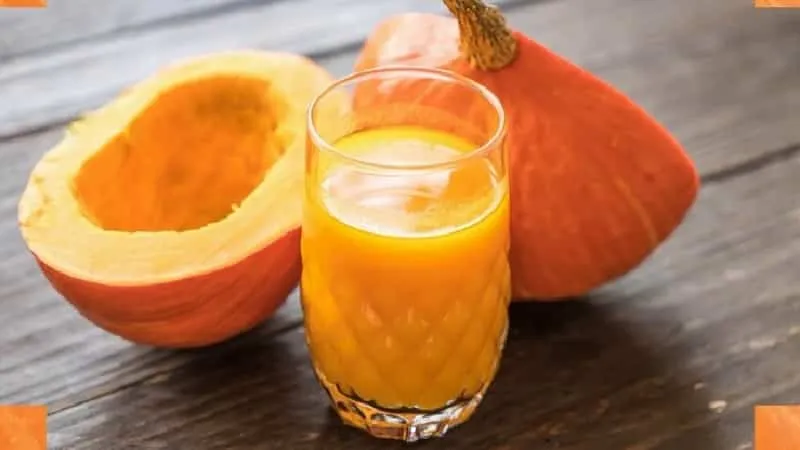
Contraindications
Pumpkin juice is not recommended for:
- acute pancreatitis;
- acute cholecystitis;
- severe diabetes;
- low stomach acidity.
Note: For stomach ulcers or severe gastrointestinal disorders, consult a doctor before consumption. Improper intake may worsen symptoms.
The juice may cause harm in cases of unexplained allergies. Always consult a pediatrician before introducing it to a child’s diet.

Reviews
The juice is popular for its nutritional value, health benefits, and pleasant taste.
Sophie, Berlin: “I knew pumpkin was healthy but was amazed by this simple juice recipe—just pumpkin, citric acid, a pot, and a blender. Pro tip: use Honey pumpkin for the best flavor. The result is delicious and plentiful!”
Emma, Paris: “As a child, I drank pumpkin juice at summer camp. Years later, I tried making it at home. Though I’m not a pumpkin fan, this juice is a must—nutritious and tasty.”
Luca, Rome: “I adore pumpkin juice, a childhood favorite thanks to my mother. Every autumn, we make fresh batches and preserve some for winter. Many friends have never tried it—they’re missing out!”
Conclusion
Pumpkin juice, whether pure or mixed with other vegetable and fruit juices, offers immense health benefits: boosting immunity, aiding vitamin E absorption, and combating parasites. Its vitamins and minerals are more bioavailable than synthetic supplements. Preparing the juice is simple—just a few ingredients and minimal time, with pumpkin as the star.

